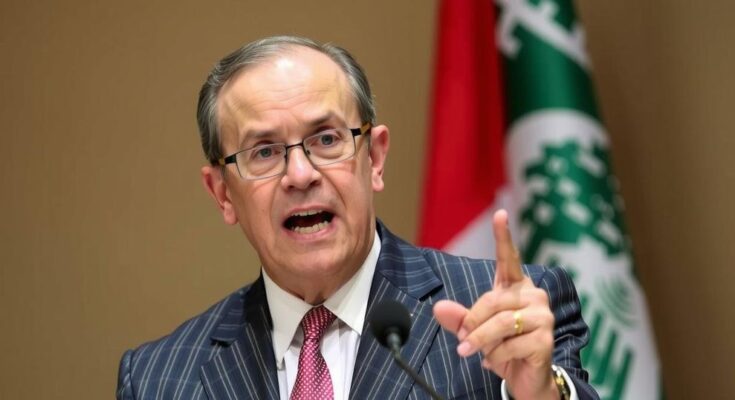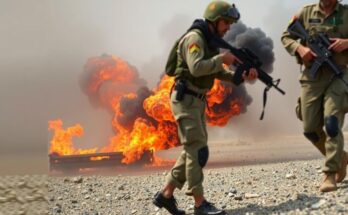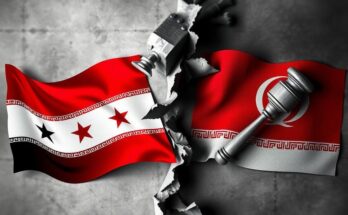Lebanon’s caretaker Prime Minister Najib Mikati called on the US and France to expedite the withdrawal of Israeli forces from Lebanon, ensuring resolution of disputes related to the UN-designated Blue Line. In his visit to the southern frontlines, he addressed extensive damage from recent conflicts and emphasized the importance of reconstruction efforts, with a focus on implementing UN Security Council resolutions to ensure stability and cooperation with international partners.
BEIRUT: Lebanon’s caretaker Prime Minister Najib Mikati urged the United States and France to accelerate the withdrawal of Israeli forces from Lebanon, coinciding with a delicate ceasefire agreement established approximately one month ago between Israel and Hezbollah. Prime Minister Mikati reaffirmed his dedication to resolving all issues pertaining to the Blue Line—the UN-designated boundary between Lebanon and Israel—to eliminate any grounds for Israeli occupation of Lebanese territories.
During his inaugural visit to the southern frontlines, Mikati remarked that Lebanese troops are poised to gradually deploy under the US-brokered ceasefire agreement, anticipating the withdrawal of Hezbollah and Israeli personnel by the end of the forthcoming month. From the border town of Khiam, he highlighted his collaborative efforts with the World Bank, European Union, Arab nations, and international partners to establish a trust fund aimed at facilitating reconstruction initiatives.
The World Bank reported in October that the recent hostilities resulted in an estimated physical damage assessment of at least $3.4 billion in Lebanon. Prime Minister Mikati, being the first high-ranking Lebanese official to visit Khiam post-Israeli withdrawal and Lebanese army deployment, evaluated the widespread destruction inflicted by Israeli forces.
Expressing dismay over the devastation, Mikati reiterated the urgency for Israel to withdraw from Lebanese territories. He stated, “These are essential issues for the Lebanese army to be ready to carry out its duties in full.” He affirmed that the implementation of UN Resolution 1701 will proceed as intended, aided by guarantees from American and French authorities.
Mikati expressed concern over delays linked to the Israeli side, indicating that procrastination was not attributable to the Lebanese military but rather reluctance from Israel itself. He continued, “We must consult the parties to the ceasefire agreement… to expedite the process as much as possible.” He emphasized the Lebanese government’s obligation to adhere to international law and pledged to enforce UN Security Council resolutions effectively.
In terms of reconstruction planning, Mikati assured that they will progress within a transparent framework. The ceasefire, which took effect on November 27, followed over a year of escalating tensions between Israel and Hezbollah amidst the ongoing Gaza conflict. This visit marked Mikati’s first inspection of the southern border region since the ceasefire’s implementation, during which he praised the morale of the Lebanese Armed Forces and their commitment to national unity.
Mikati expressed optimism that the anticipated meeting with US, French, and Lebanese military representatives will move forward discussions on the Lebanese army’s deployment following Israel’s withdrawal. Meanwhile, General Joseph Aoun pledged to uphold their mission of protection despite limited resources. The delegation later visited UNIFIL headquarters, where discussions centered on coordinating efforts with the Lebanese army.
The backdrop to this situation is rooted in continuous tensions between Lebanon and Israel, particularly with Hezbollah as a prominent actor. The region has recently witnessed intensified hostilities, leading to the establishment of a fragile ceasefire facilitated by US and French diplomatic efforts. The Blue Line, established by the UN, has often been a point of contention, with both countries having historical disputes regarding territorial integrity. The current emphasis on reconstruction and international cooperation highlights the dire need for stability in the southern Lebanon region post-conflict.
In conclusion, Prime Minister Najib Mikati is advocating for a swift Israeli withdrawal from Lebanese territories while rallying international support for reconstruction following significant damage incurred during hostilities. His visit to southern Lebanon underscores the commitment to implementing UN Security Council resolutions and fostering collaboration between the Lebanese army and international forces for long-term stability. Continued consultations with global powers like the US and France will be vital in resolving the protracted conflicts and ensuring the effective deployment of Lebanese military forces in contested regions.
Original Source: www.arabnews.com




